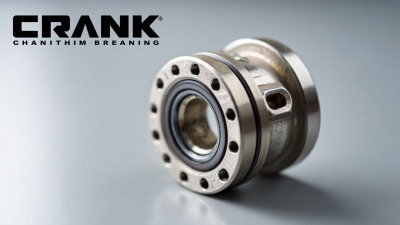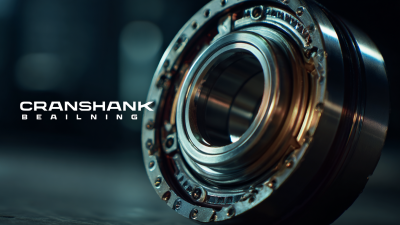 +86 13794985240
+86 13794985240
Leave Your Message
-
 CONTACT NUMBER
CONTACT NUMBER -
 CONTACT NUMBER
CONTACT NUMBER -
 CONTACT NUMBER
CONTACT NUMBER



In the high-stakes world of automotive manufacturing, sourcing the perfect crankshaft bearings is crucial for ensuring engine performance and longevity. According to a report by MarketsandMarkets, the global automotive bearing market is expected to reach $66.8 billion by 2025, driven by the increasing demand for fuel-efficient and low-emission vehicles. As one of the key components, crankshaft bearings play a vital role in reducing friction between the crankshaft and the engine block, which directly impacts fuel efficiency and engine durability. However, with numerous suppliers worldwide, finding quality crankshaft bearings that meet stringent industry standards can be challenging. In this blog, we will explore seven essential tips to help manufacturers effectively source the ideal crankshaft bearings, ensuring optimal performance and reliability for their products.

When it comes to engine performance, the quality of crankshaft bearings plays a pivotal role. These components serve as the interface between the crankshaft and the engine block, allowing for smooth rotation and minimizing friction. High-quality crankshaft bearings ensure optimal load distribution and contribute significantly to the longevity of the engine. Forging and machining processes, material selection, and surface treatments all influence the performance of bearings, making it crucial for manufacturers to source only the best options available on the market.
Inadequate or subpar crankshaft bearings can lead to catastrophic engine failure. Poor performance may be characterized by increased oil temperatures, unusual vibrations, and premature wear, ultimately affecting the overall efficiency of the vehicle. Thus, understanding the integral function of these bearings not only enhances engine performance but also assures the durability and reliability needed for high-performance applications. This highlights the importance of meticulous sourcing strategies, as selecting high-grade bearings directly correlates with the operational success of any engine.
| Tip Number | Tip Description | Key Considerations | Impact on Performance |
|---|---|---|---|
| 1 | Research Manufacturers | Identify reputable manufacturers with certifications | Ensures quality and reliability |
| 2 | Evaluate Material Quality | Select bearings made from high-grade materials | Affects durability and performance under stress |
| 3 | Check Dimensional Accuracy | Ensure exact specifications match engine requirements | Critical for proper fit and function |
| 4 | Assess Seal Design | Consider sealing effectiveness to prevent contaminants | Prolongs lifespan and maintains performance |
| 5 | Review Supplier Terms | Understand warranty, return policy, and delivery terms | Mitigates risks and enhances service levels |
| 6 | Request Samples | Test samples for quality and performance | Prevents costly mistakes |
| 7 | Seek Expert Opinions | Consult industry experts for insights and recommendations | Informs better sourcing decisions |
When sourcing crankshaft bearings internationally, several key factors come into play that can significantly impact the quality and viability of your supply chain. The first consideration is the reputation and reliability of the manufacturers. Researching potential suppliers' track records and customer reviews is vital to ensure they adhere to stringent quality standards that meet your specific engineering needs. Establishing a relationship with manufacturers known for their durability and precision can help mitigate risks associated with poor-quality components.
Another critical factor is understanding the regulatory standards in both your country and the supplier’s location. Different regions have varying compliance requirements for automotive components. Ensuring that the bearings you source meet your local regulations will save time and costs associated with reworking non-compliant products. It's also worthwhile to explore the logistics and shipping implications involved in international sourcing. This includes lead times, shipping costs, and customs laws, which can all affect the efficiency of your operations. By examining these elements closely, you can create a seamless sourcing process that enhances your overall production capabilities.
When it comes to sourcing crankshaft bearings, identifying reliable suppliers is paramount for ensuring product quality and reliability. Start by conducting thorough research into potential suppliers’ reputations in the industry. Online platforms and forums can provide valuable insights into other customers' experiences, helping you gauge the credibility of a supplier. Consider reaching out to other businesses or professionals in your network who have prior experience with specific suppliers. Their feedback can be instrumental in making informed decisions.
Additionally, it’s crucial to evaluate the manufacturing processes and quality control measures of potential suppliers. Look for certifications and adherence to industry standards, which indicate a commitment to quality. Request samples of crankshaft bearings to check their performance and specifications before committing to a larger order. Engaging in direct communication with the suppliers can also unveil their level of expertise and customer service, further confirming their reliability. Establishing a relationship based on transparency and trust with your supplier can lead to a mutually beneficial partnership in the long run.
When sourcing crankshaft bearings globally, understanding the various regulations and standards is crucial for ensuring product quality and compliance. Different countries have established unique guidelines that govern the manufacturing and testing of bearings, making it essential to be well-versed in these requirements. For instance, manufacturers in the European Union must comply with strict environmental and safety regulations, such as the REACH and RoHS directives. Familiarizing yourself with these standards can prevent costly import delays and ensure that the bearings meet safety measures for engine performance.
Furthermore, certification from recognized bodies can greatly influence your sourcing decisions. Look for suppliers who hold certifications like ISO 9001, which signifies adherence to quality management principles. Additionally, compliance with industry-specific standards, such as those from the American Society for Testing and Materials (ASTM), can provide assurance that the bearings meet performance and reliability expectations. Keeping abreast of global regulations not only streamlines the procurement process but also enhances your reputation by ensuring that you offer high-quality, compliant products to your customers.

In the current landscape of industrial procurement, especially in sourcing crankshaft bearings, effective cost management strategies are paramount. The global spending management software market is projected to grow from $7.64 billion in 2024 to $16.48 billion by 2032, reflecting a compound annual growth rate of 10.1%. This growth underscores the increasing importance of sophisticated procurement tools that leverage data analytics and artificial intelligence to enhance decision-making and optimize spend across various categories, including crankshaft bearings.
Companies are increasingly recognizing the necessity of robust supply chain management strategies to maintain a competitive edge. The recent challenges posed by the COVID-19 pandemic have accentuated the vulnerabilities within supply chains, thus driving organizations to adopt more resilient and agile procurement practices. By integrating digital solutions, businesses can not only streamline their sourcing processes but also ensure that they are sourcing high-quality materials at competitive prices. As manufacturers transition towards more data-driven approaches, procurement professionals must capitalize on technology to mitigate risks and manage costs effectively, ensuring the sustainability of their operations in an ever-evolving market.







